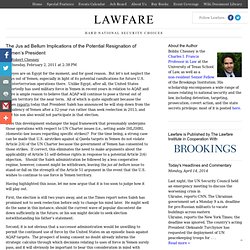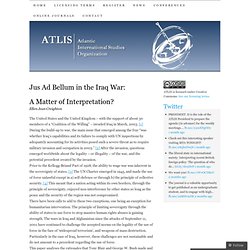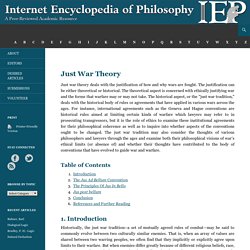

The Jus ad Bellum Implications of the Potential Resignation of Yemen’s President. All eyes are on Egypt for the moment, and for good reason.

But let’s not neglect the news out of Yemen, especially in light of its potential ramifications for future U.S. counterterrorism operations there. Unlike Egypt, after all, the United States reportedly has used military force in Yemen in recent years in relation to AQAP, and there is ample reason to believe that AQAP will continue to pose a threat out of Yemen territory for the near term. All of which is quite significant because the Times reports today that President Saleh has announced he will step down from the presidency of Yemen after a 32-year run rather than seek reelection in 2013, and that his son also would not participate in that election. Does this development endanger the legal framework that presumably underpins those operations with respect to UN Charter issues (i.e., setting aside IHL/IHRL/domestic-law issues regarding specific strikes)?
‘Jus ad bellum’, ‘jus in bello’ . . . ‘jus post bellum’? –Rethinking the Conception of the Law of Armed Force. Jus Ad Bellum in the Iraq War: Ellen Jean Creighton The United States and the United Kingdom – with the support of about 30 members of a “Coalition of the Willing” – invaded Iraq in March, 2003. [1] During the build-up to war, the main issue that emerged among the fray “was whether Iraq’s capabilities and its failure to comply with UN inspections by adequately accounting for its activities posed such a severe threat as to require military invasion and occupation in 2003.” [2] After the invasion, questions emerged worldwide about the legality – or illegality – of the war, and the potential precedent created by the invasion.

There have been calls to add to these two exceptions, one being an exception for humanitarian intervention. The principle of limiting sovereignty through the ability of states to use force to stop massive human rights abuses is gaining strength. This paper analyses the rationales that Tony Blair and George W. Bush made and continue to make to justify their actions in Iraq. Self-Defence. What are jus ad bellum and jus in bello?
Extract from ICRC publication "International humanitarian law: answers to your questions"

Just War Theory. St. Augustine of Hippo. War Theory & Just War. Principles of the Just War 1.

A just war can only be waged as a last resort. All non-violent options must be exhausted before the use of force can be justified. 2. A war is just only if it is waged by a legitimate authority. Just War Theory Just war theory deals with the justification of how and why wars are fought.

The justification can be either theoretical or historical. The theoretical aspect is concerned with ethically justifying war and the forms that warfare may or may not take. The historical aspect, or the "just war tradition," deals with the historical body of rules or agreements that have applied in various wars across the ages. For instance, international agreements such as the Geneva and Hague conventions are historical rules aimed at limiting certain kinds of warfare which lawyers may refer to in prosecuting transgressors, but it is the role of ethics to examine these institutional agreements for their philosophical coherence as well as to inquire into whether aspects of the conventions ought to be changed.
Table of Contents. War. First published Fri Feb 4, 2000; substantive revision Thu Jul 28, 2005 War should be understood as an actual, intentional and widespread armed conflict between political communities.

Thus, fisticuffs between individual persons do not count as a war, nor does a gang fight, nor does a feud on the order of the Hatfields versus the McCoys. War is a phenomenon which occurs only between political communities, defined as those entities which either are states or intend to become states (in order to allow for civil war). Classical war is international war, a war between different states, like the two World Wars. But just as frequent is war within a state between rival groups or communities, like the American Civil War. What's statehood? All these distinctions will come in handy as we proceed. The mere threat of war, and the presence of mutual disdain between political communities, do not suffice as indicators of war.
War is a brutal and ugly enterprise. 1.